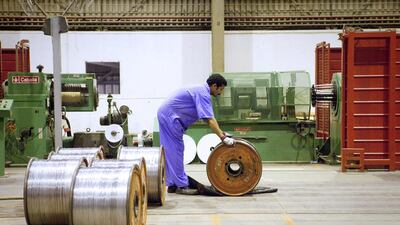Ducab, the Dubai-based power cables maker, has launched one of the world’s first Sharia-compliant metals hedging practices.
Bankers say the move is the cusp of a wave of "Islamification" of business practices as companies seek to tap more Islamic financial instruments.
Ducab has converted more than 70 per cent of its US$700 million annual copper hedging to Islamic practices since the start of the year. It aims to convert the remainder, as well as its aluminium contracts, in the coming months. “Strengthening Islamic economic principles are an integral part of our overall approach to growth and development,” said Andrew Shaw, the managing director of Ducab.
“We will further continue to explore such ideas in other parts of our business. We hope that risk management practices globally in the metals industry will adopt these practices in the coming months.” For the past two decades, Ducab has been using metals price risk management – known as hedging – to safeguard itself from volatility in prices of copper and other metals. A global glut of copper supply will drag prices to their lowest level in at least three years, according to a Bloomberg report last month, citing analysts’ forecasts. Prices for copper delivered in three months were trading at US$7,070 per tonne yesterday on the London Metal Exchange.
But after requests from the company’s board to use Islamic financing products where possible, Ducab last year began talks with Société Générale, the French bank, about how to make its hedging scheme Sharia-compliant.
“The concept of hedging, risk management is not prohibited under Islamic finance but the conventional use of derivatives are prohibited so we used techniques that are permitted within the scope of Islamic finance,” said Mohamed Virani, the head of Islamic products, Middle East Institutional Sales at Société Générale. “Using these Islamic techniques with coordination with renowned scholars we were able to get a product that meets the requirement of Ducab.”
Mr Virani said the bank was in talks with other companies in the region keen to develop other Islamic finance products and services.
“There is a general ‘Islamification’ in the banking sector and other sectors,” he said. “It is not just linked to the banking sector and we hope to see more of this proliferating going forward.”
Sheikh Mohammed bin Rashid Vice President of the UAE and Ruler of Dubai, is striving to make Dubai a centre of the global Islamic economy, estimated as having a potential value of US$6.7 trillion, according to a report released this week by the Dubai authorities and Thomson Reuters.
Ducab produces about 105,000 tonnes of copper cables per year, and is linking up with Senaat, an Abu Dhabi state-owned industrial conglomerate and a Ducab shareholder, to open an aluminium rod mill in Abu Dhabi.
Now the company is keen to persuade other companies using the global metals exchanges in London, Chicago and Shanghai to adopt Islamic trading practices. The London Metal Exchange yearly trades more than $14tn in contracts. “This product should be available for use by other Mena and GCC region companies interested in converting to Islamic finance structures,” said Arif Choksy, Ducab’s chief financial officer.
“We hope to make it a standard product to be traded on the London Metal Exchange in the due course of time.”
tarnold@thenational.ae

